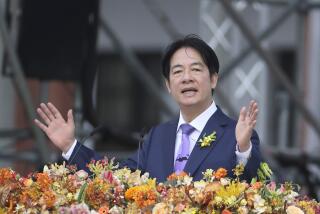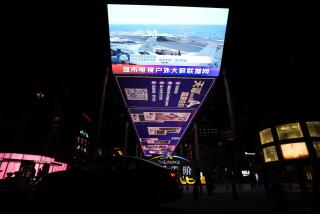China’s Army Uneasy About a Crackdown
- Share via
WASHINGTON — Last Saturday, after China’s army units were called into Beijing to enforce martial law against massive demonstrations for democracy, a Chinese army official went to great lengths to justify the troop movements to the nation.
“The People’s Liberation Army is the people’s own army, and they are to defend the country and the people,” the PLA spokesman said. “Their entering into Beijing is by no means directed at the students, let alone ‘suppressing the students.’ ”
Army’s Discomfort
That statement, reflecting the discomfort felt by the PLA in its present situation, helps explain one of the most striking features of the current crisis in China: How it is that Beijing’s authoritarian leaders have had such apparent difficulty bringing about a military crackdown.
According to scholars and experts on the Chinese military, the decision by Chinese leader Deng Xiaoping and Premier Li Peng to call out the troops against the demonstrations for democracy puts the PLA in an awkward political position that it did not expect and for which it was ill-prepared.
“For the past decade, the Chinese military has been trying to refocus its image,” said Paul H. B. Godwin, a China scholar at the Defense Department’s National War College here. “They think of themselves as a national security force, dedicated to preserving China’s security against foreign powers. If you put them into this sort of stuff, you go against the grain of the past decade and remind them of the ways they were used in the Cultural Revolution.”
During the 1966-1976 Cultural Revolution, Chinese military units were used to restore order when the Red Guards, called out by Chairman Mao Tse-tung, brought China to the verge of anarchy.
In immediate political terms, there are reasons to expect the ordinary soldiers to sympathize with the Chinese students who have been demonstrating for democracy.
‘Rise in Prices’
“The students and the army have something in common,” observed Dr. June Teufel Dreyer, a professor of political science and China specialist at the University of Miami. “Both have been hurt very badly by Deng’s free-market reforms, which have caused a sharp rise in prices. . . . This is even more of a problem for them than for other elements of Chinese society, because the students and military people are on fixed incomes. Workers get bonuses and things like that.”
Also, the ranks of the PLA’s 38th Army, a unit stationed outside Beijing that reportedly refused to move against the demonstrators, is filled with young men conscripted from the Beijing area.
“This corps would have young men and women with friends in the democracy movement,” said one U.S. source familiar with Chinese military units. “They’re not the army you’d want to turn to in a situation like this.”
Apart from current politics, the use of the army against the demonstrations runs against both the old traditions of the PLA and its recent history.
Under Mao, Chinese army units for years were indoctrinated about “people’s war.” The guiding philosophy was that the mass support of the Chinese people was an important, even essential element of the PLA’s military strategy.
The concept of “people’s war” grew out of the army’s successful military campaign against Chiang Kai-shek’s Nationalist regime. During the civil war, political support from the Chinese people was essential for Mao’s guerrilla army to obtain food, supplies and volunteers.
After the Communist victory of 1949, “people’s war” remained an important component of Chinese military thought. Mao and other Chinese military leaders believed that the best strategy for defending the nation was to rely on the PLA’s ability to defeat opponents by tying them down in a long war inside Chinese territory.
Thomas E. Robinson, an American Enterprise Institute specialist on the Chinese military, says that the doctrine of “people’s war” now inhibits the use of the PLA against Chinese demonstrators.
“This is the reverse of what they’re supposed to do and (what they are) trained to do,” Robinson said. “They’re supposed to protect against foreign enemies.”
Changing Concept
Since Mao’s death in 1976, the army has gradually deemphasized the concept of “people’s war.” Instead, military leaders have focused on the importance of modern arms, equipment and technology, recognizing that the outcome of some future war might depend more on what weapons and missiles the PLA possesses than on its ability to mobilize the population.
This trend was accelerated after the army was embarrassed by its unsuccessful invasion of Vietnam in 1979. Within only a few weeks, after suffering heavy casualties and confronting serious problems in logistics, the PLA withdrew from Vietnam.
Despite the change in emphasis, Chinese soldiers and officers are still taught about the PLA’s great tradition of “people’s war.”
“The changes are only at the operational level,” Godwin said. “At the doctrinal level, they still claim they’re fighting a people’s war. It’s just a people’s war under modern traditions. Because of this doctrine, the use of the PLA (against the Beijing demonstrations) would go against the grain.”
In 1985, as part of a modernization, the Chinese regime launched the largest demobilization in the PLA’s history. By Chinese estimates, the size of the PLA was reduced by about 1 million soldiers, from about 4.2 million to about 3.2 million. Foreign sources believe that the demobilization was somewhat smaller, but still substantial.
One effect was to reduce the PLA’s effectiveness for jobs such as the Beijing demonstrations. A number of local-force units within the PLA were transferred to local public security forces. Experts say that the PLA interpreted these transfers to mean that it would be up to local public security units, not the regular army, to handle civil disturbances.
“The army just doesn’t want to get caught in the middle of this,” observed Godwin. “These guys in the PLA are not naive people. They know there’s a split in the Chinese leadership and they don’t want to get caught up in it.”
More to Read
Sign up for Essential California
The most important California stories and recommendations in your inbox every morning.
You may occasionally receive promotional content from the Los Angeles Times.













